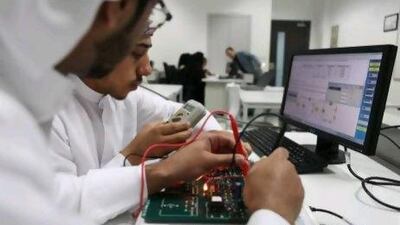Special-needs pupils must be taught vital life skills to ensure they are not left “sitting at home” after leaving school, education experts said.
Parents and teachers speaking at the Inclusion and Wellbeing – Mena 2019 conference organised by Optimus Education last week also called for more vocational education courses for those who don’t want to pursue an academic path. They pointed to countries where colleges offer qualifications in technical and electrical work plus cooking, hospitality and administration, among other fields.
April McCabe, who has a child, 15, with autism, said vocational courses would particularly help to provide more opportunities in the workplace for young people with special needs.
“That is one thing that is lacking here,” Ms McCabe said at an education event in Dubai last week.
“For children with special needs, they finish school at 18 and then there is nothing.
“These children just sit at home. They don’t have any job skills and they don’t have anything to look forward to, and their behaviour escalates.”
A 2014 study by Deloitte found that only one per cent to three per cent of academic enrolment in the Emirates is in vocational education, while the global average is 10 per cent.
In Germany, about 50 per cent of children leaving school take up vocational training instead of going to university.
Nan Billingham, principal at School of Research Science in Dubai, said there was an academic-centric culture in the UAE and that vocational courses must be more widely recognised.
“Culturally in the UAE, there is an expectation that 100 per cent of pupils go to university or higher education,” she said.
“That’s not the case in UK or other countries, where maybe 60 per cent of people go to university and others may have an alternative path.”
Her school offers Business and Technology Education Council qualifications.
“It would be great if here in the UAE the authorities would acknowledge the BTEC and Asdan [a British charity, curriculum development and qualification-awarding body] courses.
“I know they are looking at it.
“These are not recognised by local authorities.
“I know some universities will consider these but not the local universities.” At present, the only such colleges are government-run and cater for Emiratis seeking to study technical courses, such as Abu Dhabi Polytechnic.
Louise Dawson, head of inclusion at Kings’ School Al Barsha, said the school was starting a BTEC programme in September that offers school-leaver qualifications.
“We [in Dubai] don’t offer enough pathways and vocational is the big next step,” she said.
“Parents here want their children to be academically successful.
“They want them to have qualifications in English, mathematics, science, history, geography.
“In the UK, our vocational courses would be in subjects such as bricklaying, tourism and hairdressing but families here don’t always want that for their children.
“We have just introduced additional curriculum pathways.
“Traditionally, we are a GCSE and A-level school but we are now bringing in Asdan and have a BTEC programme.”
Asdan programmes are qualifications that help pupils learn skills through personalised education.
The teacher believes that pupils buy into vocational education as it teaches them real-life, transferable skills.
In 2017, The National reported a surge in Emiratis enrolling in more vocational courses, with pupils taking up studies in business, aviation maintenance, health sciences and media production.


